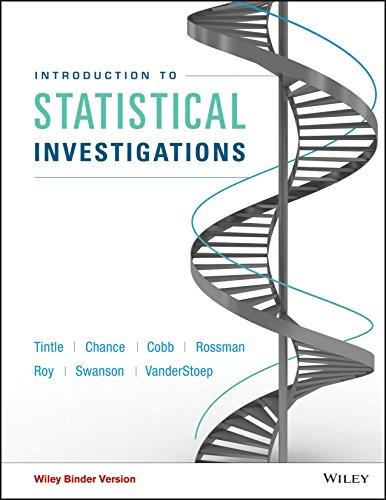In order to discern whether or not Janine can land a majority of her short serves in
Question:
In order to discern whether or not Janine can land a majority of her short serves in bounds, we will employ the 3S strategy.
a. Statistic: How many times did Janine land a short serve in bounds? Out of how many service attempts?
b. Simulate: Using an applet, simulate 1,000 repetitions of having Janine serve 30 right-handed short serves if she is just as likely to serve in as she is to not serve in. Where is the distribution centered?
c. Based on the value of the statistic from part (a), do you think the chance model is wrong? Why or why not?
d. Strength of evidence: Based on your answers for (a)–(c), state your conclusions about the research question of whether the data provide convincing evidence that Janine can get her short serve in with her left hand more than 50% of the time.
e. Are the results of this study statistically significant or is the chance model plausible? How are you deciding?
Janine is an ambidextrous volleyball player. She is practicing “short serves” in volleyball because her team has an upcoming match against an opponent who does not pass short serves very well. Janine must land a majority of her “short serves” in bounds or her coach will not let her use her short serve in the upcoming match. When serving left -handed Janine makes 23 out of 30 serves.
DistributionThe word "distribution" has several meanings in the financial world, most of them pertaining to the payment of assets from a fund, account, or individual security to an investor or beneficiary. Retirement account distributions are among the most...
Step by Step Answer:

Introduction To Statistical Investigations
ISBN: 9781118172148
1st Edition
Authors: Beth L.Chance, George W.Cobb, Allan J.Rossman Nathan Tintle, Todd Swanson Soma Roy





